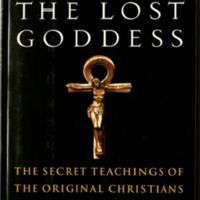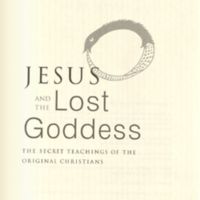Jesus and the lost goddess: the secret teachings of the original Christians
Dublin Core
Title
Jesus and the lost goddess: the secret teachings of the original Christians
Subject
Gnosticism
Wisdom (Gnosticism)
Theology, Doctrinal -- History -- Early church, ca. 30-600
Wisdom (Gnosticism)
Theology, Doctrinal -- History -- Early church, ca. 30-600
Description
Publisher Fact Sheet In Jesus and the Lost Goddess, Timothy Freke and Peter Gandy take their ideas about the pagan origins of Christianity in a startling new direction. Did the original Christians revere a goddess with the same fervor they bestowed on the Son of God? Did they regard the New Testament story we are familiar with today as a myth for spiritual beginners, with the highest spiritual wisdom contained in other gospels that were later deemed heretical by the Roman Church? Basing their argument on first-class scholarship, while expressing it in easily accessible language, Freke and Gandy assert that these other gospels tell of a mystical marriage between a godman and a goddess, represented in Christian tradition by the figures of Jesus and Mary Magdalene. The authors' claim about a goddess who encompasses woman in all her aspects, from sensual lover to spiritual principle, is certain to ignite debate as passionate as that created by their remarkable book The Jesus Mysteries.
Annotation Building on the startling discoveries contained in their first book, The Jesus Mysteries, Freke and Gandy probe the pagan origins of Christianity even further and relate another illuminating fact: The original Christians revered not just a Godman, but also a Goddess, Sophia. They show through studies in comparative literature and religions up to that time, from the stories of Isis, to the teachings of Plato to the letters of St Paul (earlier Saul), that the myth of the Godman and the Goddess is clearly a literary synthesis of ancient Egyptian, more recent Greek, and then-contemporary Jewish myths. The authors' research also proves that those early Christian Gnostics regarded what has now become The New Testament, as a collection of stories for spiritual beginners; an understanding of its messages is a completion of only the first step on the road to enlightenment and it should not be seen as completion of the ultimate lesson in Christian teaching. In fact, in their view, the highest level ofspiritual wisdom could be sought through reading other gospels that were later excluded from The New Testament by the Holy Roman Church because.
Annotation Building on the startling discoveries contained in their first book, The Jesus Mysteries, Freke and Gandy probe the pagan origins of Christianity even further and relate another illuminating fact: The original Christians revered not just a Godman, but also a Goddess, Sophia. They show through studies in comparative literature and religions up to that time, from the stories of Isis, to the teachings of Plato to the letters of St Paul (earlier Saul), that the myth of the Godman and the Goddess is clearly a literary synthesis of ancient Egyptian, more recent Greek, and then-contemporary Jewish myths. The authors' research also proves that those early Christian Gnostics regarded what has now become The New Testament, as a collection of stories for spiritual beginners; an understanding of its messages is a completion of only the first step on the road to enlightenment and it should not be seen as completion of the ultimate lesson in Christian teaching. In fact, in their view, the highest level ofspiritual wisdom could be sought through reading other gospels that were later excluded from The New Testament by the Holy Roman Church because.
Creator
Timothy Freke and Peter Gandy
Publisher
New York : Harmony Books
Date
2001
Text Item Type Metadata
Original Format
Book
Citation
Timothy Freke and Peter Gandy, “Jesus and the lost goddess: the secret teachings of the original Christians,” Humanities Hub, accessed February 11, 2026, https://humanitieshub.sdsu.edu/omeka/items/show/1130.


